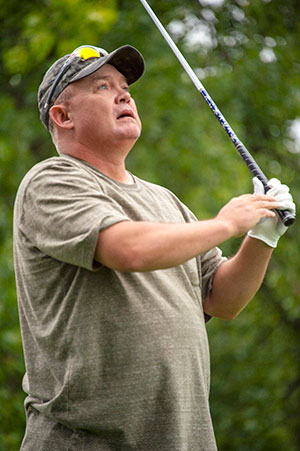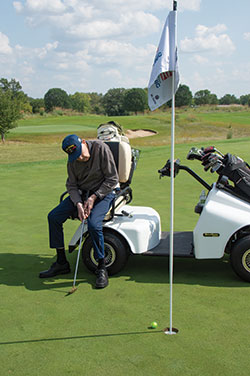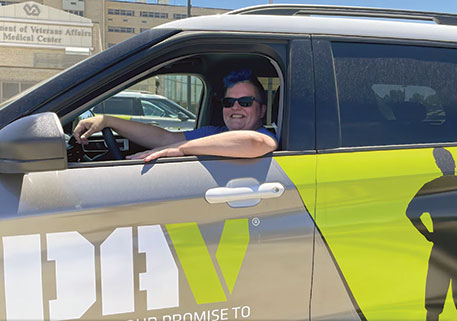
Golf is a sport that Marine and Iowa Army National Guard veteran Robert Hunter says he loves to hate.
As many casual golfers can attest, being on the course can bring out a range of emotions, but it’s the mental clarity Hunter gets after a nice shot that keeps him playing.
“When you hit that perfect shot, all the frustration goes away,” Hunter said. “It’s like everything just disappeared for that shot. You look forward to the next hole.”
This mental clarity is a big deal for Hunter, who uses golf as a form of therapy.
In 2005, while he was deployed to Iraq with his National Guard unit, an improvised explosive device (IED) detonated near his Humvee, throwing him across the vehicle and causing a severe traumatic brain injury.
Life hasn’t been the same since. He’s had to relearn how to do many basic tasks.
“You might’ve been able to do something before and not even think about it,” Hunter said. “And now when you try to do that exact same thing, you’ve got to change the whole way that you do it, because your body will not react to the way it was before the concussion from the blasts of the IEDs.”
He said he got to a point where he didn’t want to do anything because it hurt or it might worsen his injuries. But two years ago, he agreed to try golf to improve his quality of life.
Hunter is one of the more than 200 disabled veteran golfers who traveled to Riverside, Iowa, in September for the 30th National Disabled Veterans Golf Clinic, co-presented by DAV and the Department of Veterans Affairs. The weeklong adaptive sports clinic allows veterans facing the challenges of blindness, amputations, spinal cord injuries and severe brain injuries the opportunity to golf and try other activities.
The Iowa City VA Health Care System and 20 sponsors—including nine DAV departments and chapters and the DAV State Commanders and Adjutants Association—helped make the event possible.
A team of more than 400 volunteers and VA staff, many of whom were representatives from the sponsoring organizations, were guides and coaches across four local golf courses and the Terry Trueblood Recreation Area. Participants also had access to PGA and LPGA professionals, physical therapists, nurses, physicians, and alternative activities facilitators.
Alternate activities this year included biking, kayaking, rock climbing, bowling and air rifle shooting, with each experience adapted to a participant’s specific disability.
“Adaptive sports have the power to pull you out of your comfort zone and show you that your world isn’t defined by perceived limitations,” DAV National Commander Nancy Espinosa told participants at the beginning of the clinic. “Adaptive sports also connect you to a community of veterans who can relate to your experience and are willing to stand by your side even in tough times.”


The bonds were evident throughout the clinic. Raucous celebration by his teammates broke out when 107-year-old World War II Navy veteran Donald Johnson sank a 12-foot putt on the eighth green at Blue Top Ridge Golf Course. Johnson, who had to give up golfing regularly when he was 102, was thrilled to once again be playing the game he had enjoyed most of his life.
“Just one more hole!” he said after leaving each green.
First-time clinic participant Antonio Macias attended with his recreational therapist, Sharmel Bender, who works at the Sacramento VA Medical Center in Mather, California, and volunteered to be his golf buddy.
Macias, an Army veteran, became blind after a retinal detachment in his right eye in 2008 and then in his left eye in 2016. Last year, Bender encouraged him to try golf to help him cope with what happened.
“Overall, it’s helped me a lot to overcome many of my mental issues and emotional issues,” he said. “I think what appealed to me was the discipline of learning the techniques and learning how to let go of everything inside your head.”
He said it’s taken nearly six years to come to terms with being blind, and while he still faces an uphill battle, he’s thankful for Bender’s encouragement.
“If it wasn’t for you, I would’ve quit a long time ago,” Macias said to her during putting practice.
“I’m here to help you find your happy place,” Bender responded. “I want you to find your place that gets you back to where you were.”
For Marine veteran John Tibbs, severe open-angle glaucoma caused his blindness. But he found a renewed sense of freedom kayaking at the clinic—something he says he’ll continue when he returns home to Maryland.
“It’s exhilarating! I’m out here by myself in the middle of the water kayaking,” Tibbs said. “I can only see about [2 feet in front of me]. … I’m just determined not to let this blindness stop me.”
“Year after year, this clinic changes lives,” DAV National Voluntary Services Director John Kleindienst said. “We witness veterans across multiple generations face difficult obstacles and challenges head-on. Through the power of adaptive sports, they’re leaving happier, healthier and with newfound skills and hobbies that will help them immensely on their recovery journey.”
Hunter said he’s become an advocate of adaptive sports as part of recovery. At the clinic’s closing ceremonies, he received the DAV Freedom Award, presented to the participant who best embodies the spirit of the event. He showed positivity and enthusiasm on the course, encouraging his teammates and working to improve his game.
“DAV and the VA put this on so we can bring veterans and people closer together, get them out of the house, get them moving, get them active, get them trying new things, and that’s what this is all about,” Hunter said.





